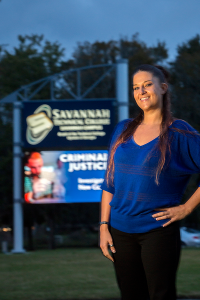From class project to reality: STC drafting student designs exterior sign erected at three campuses

SAVANNAH – When Michelle Methot was a drafting student at Savannah Technical College three years ago, she had no idea that her design concept would set a new standard for exterior signage at the college. Three short years later, she beams with pride when standing by the newly-erected digital sign at the college’s Savannah Campus. Similar signage is installed at the Aviation Technology Center at the Crossroads Campus and will soon be installed at the Liberty Campus in Hinesville, Ga.
“It is inspiring and encouraging for a design of your own making come into reality,” said Methot. “No matter what the scale or purpose of the project, the gratification of the final product coming to life is what drives designers.”
The sign was originally designed to incorporate multiple disciplines within the Industrial Technology division at the College including welding, solar, electrical, mechanical drafting & design and 3-D computer modeling departments. The idea was to afford other students within these disciplines the opportunity to contribute to a student-based design that would both benefit the school and show the varied array of skills and talent that this school has to offer in one small scale project. Her design incorporates roof trusses found on campus buildings, so the sign would be consistent with existing structures.
Methot had a professional master of architecture from Savannah College of Art & Design and was designing houses when the housing market crashed. She enrolled in 3D modeling drafting classes at Savannah Technical College to master mechanical drafting software. In 2012 she was a student in the STC CATIA class, taught by Joseph Powell, now Dean of Industrial Technology at the college.
“When you design something that is actually built and used as you intended it – that’s what it’s all about,” says Powell. Of the 13 students in the class, all but Methot used Auto CAD, computer-aided design and drafting software for the project, while Methot used CATIA, software primarily used for aviation projects. Her design stood out immediately, says Powell. From there, the concept was validated by industry professionals and fine-tuned for construction.
“Michelle was a great problem solver,” says Powell of his former student. “She was always self-motivated, curious and quick to assist other students.” Now Methot is a business owner, who plans to resume her career in architecture.
Having students design project for real-world applications is a hallmark of the STC drafting program and is consistent with the college’s focus on community engagement. Over the years, drafting students have worked with the Mighty Eighth Air Force Museum to design parts for a World War II bomber, with Savannah Morning News to redesign news racks, with Forsyth Farmer’s Market for Farm Truck 912 – a mobile farmers’ market, with Serenity Gardens for a potential expansion, and with St. John’s Episcopal Church for lighting ideas in the historic sanctuary. “Projects like these provide invaluable experiences for our students. They get to test their design ideas and practice presenting like they will present to clients in the field,” says Powell.
STC’s Drafting program prepares students for a career in mechanical or architectural drafting. Whether it’s AutoCAD, Revit, Inventor, or CATIA, the Drafting department stays on the cutting edge of all the designing software available in industry. Students may earn an associate degree, diploma or technical certificates of credit. For more information visit www.savannahtech.edu/Drafting or contact the Industrial Technology Academic Advisor 912.443.5859 or sdorsey@savannahtech.edu.
###
#120 | November 18, 2015
Industrial Technology Academic Advisor: Secene Dorsey
912.443.5859 or sdorsey@savannahtech.edu
Media Contact: Amy Shaffer, APR
912.443.5512 or ashaffer@savannahtech.edu
Savannah Technical College serves Coastal Georgia with quality, market-driven technical education with campus locations in Chatham, Effingham and Liberty Counties. Serving more than 10,000 credit and non-credit students annually, Savannah Tech offers nearly 150 different instructional programs in Aviation Technology, Business and Professional Services, Industrial Technology, and Health Sciences in addition to Adult Education classes, industry-specific training and continuing education. The College serves as an economic and community development partner for the region, offering corporate and customized training and assessment programs for business and industry.
Savannah Technical College is accredited by the Southern Association of Colleges and Schools Commission on Colleges (SACSCOC) to award associate degrees, diplomas and technical certificates of credit. Questions about the accreditation of Savannah Technical College may be directed in writing to the Southern Association of Colleges and Schools Commission on Colleges at 1866 Southern Lane, Decatur, GA 30033-4097, by calling (404) 679-4500, or by using information available on SACSCOC’s website (www.sacscoc.org).
